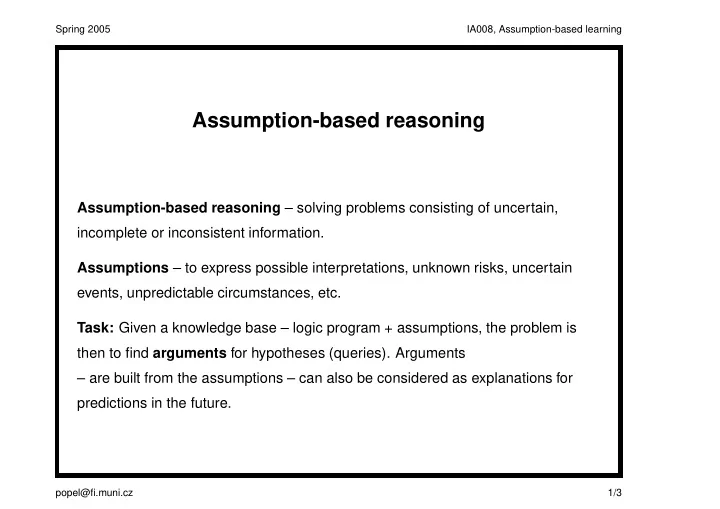

Spring 2005 IA008, Assumption-based learning Assumption-based reasoning Assumption-based reasoning – solving problems consisting of uncertain, incomplete or inconsistent information. Assumptions – to express possible interpretations, unknown risks, uncertain events, unpredictable circumstances, etc. Task: Given a knowledge base – logic program + assumptions, the problem is then to find arguments for hypotheses (queries). Arguments – are built from the assumptions – can also be considered as explanations for predictions in the future. popel@fi.muni.cz 1/3
Spring 2005 IA008, Assumption-based learning Assumptions usualy variables with a certain set of possible values argument – a conjunction of the form ”A1=value1 AND A2=value2 AND A3=value3 ...”. supports – arguments for which the hypothesis is certainly true doubts – arguments for which the hypothesis is certainly false plausibilities – arguments for which the hypothesis is possible (or plausible) assumption-based reasoning – computing sets of supports, doubts, etc. popel@fi.muni.cz 2/3
Spring 2005 IA008, Assumption-based learning Examples W = tomorrow’s weather, W 2 f r ain; no � r ain g . 1. “Tomorrow the barbecue only takes place if it is not raining” assumption f faulty,intact g hypothesis B = “the barbecue takes place” ”W=no-rain” is a support for B, ”W=rain” is a doubt of B. 2. f an aeroplane with two engines, each of them with a failure prob. 0.5 assumptions E1 and E2 with two possible values p(E1=faulty)=p(E2=faulty)=0.005, p(E1=intact)=p(E2=intact)=0.995. We know that the aeroplane only crashes when both engines are faulty at the same time, then the hypothesis ”the aeroplane crashes” has exactly one support ”E1=faulty AND E2=faulty” the corresponding degree of support is 0.005*0.005=0.000025. popel@fi.muni.cz 3/3
Recommend
More recommend